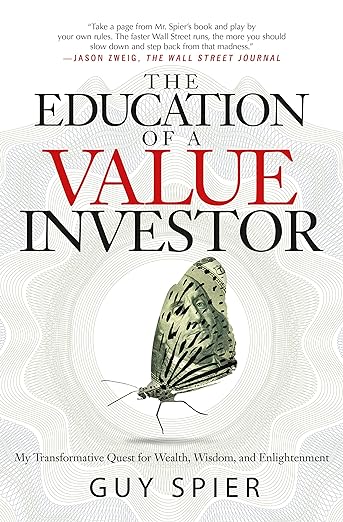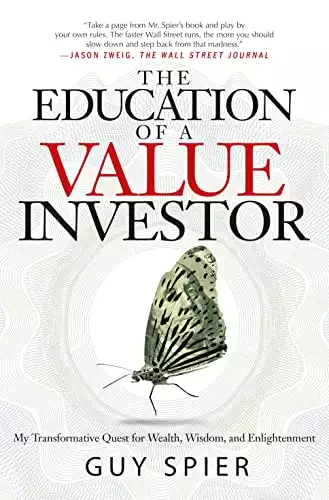Overview : The Education of a Value Investor
- Book Title: The Education of a Value Investor
- Author: Guy Spier
- Publication Date: September 2014
- price: $16.79
- Pages: 224
Overview of the Book
The book is authored by Guy Spier, a successful value investor and the manager of the Aquamarine Fund. Spier shares his journey of personal and professional transformation, influenced by the teachings of Warren Buffett and his own experiences.
Introduction
In the vast sea of financial literature, Guy Spier's "The Education of a Value Investor" stands out as a beacon of authenticity and personal growth. This memoir-cum-investment guide offers readers a unique perspective on the world of finance, blending personal anecdotes with valuable investing insights. As we navigate through Spier's journey, we'll explore how this book transcends traditional financial advice to deliver life lessons applicable far beyond the stock market.
Book Summary
Guy Spier's narrative begins with his early career at the ethically questionable D. H. Blair investment bank. This experience serves as a catalyst for Spier's transformation, pushing him towards the path of value investing – a strategy championed by legends like Benjamin Graham and Warren Buffett. The book chronicles Spier's evolution from a young, ambitious banker to a thoughtful, principled investor. Central to this transformation is Spier's admiration for Warren Buffett, culminating in a life-changing charity lunch with the Oracle of Omaha himself.
"Investing is not about beating others at their game. It's about controlling yourself at your own game." - Guy Spier
Spier delves deep into the psychological aspects of investing, exploring cognitive biases and emotional pitfalls that often trip up investors. He emphasizes the importance of self-awareness and emotional intelligence in making sound investment decisions.
Analysis of Themes
Value Investing Philosophy
At its core, "The Education of a Value Investor" is a testament to the power of value investing. Spier advocates for a patient, disciplined approach to investing, focusing on intrinsic value rather than short-term market fluctuations. This philosophy aligns closely with current market trends, where long-term, fundamental-based investing is gaining renewed appreciation amidst volatile market conditions.
Ethics and Integrity in Finance
Spier places a strong emphasis on ethical behavior in the world of finance. He argues that true success encompasses more than just financial gain, stressing the importance of aligning investments with one's moral compass. This focus on integrity is particularly relevant in today's financial landscape, where issues of corporate governance and ethical investing are at the forefront.
Personal Growth and Self-Improvement
The book goes beyond mere investment advice, offering valuable insights into personal development. Spier's journey of self-discovery resonates with readers seeking to improve both their financial acumen and overall life satisfaction.
Writing Style
Spier's writing style is refreshingly honest and accessible. He strikes a balance between personal anecdotes and practical advice, making complex financial concepts digestible for both novice and experienced investors. The narrative flow keeps readers engaged, seamlessly weaving together personal stories, investment principles, and life lessons.
Strengths and Weaknesses
Strengths:
- Authentic personal narrative
- Practical investment advice grounded in real-world experience
- Strong focus on ethics and personal growth
- Accessible writing style
Weaknesses:
- May not provide enough technical analysis for advanced investors
- Some readers might find the focus on Warren Buffett excessive
Comparison to Other Works
While "The Education of a Value Investor" shares similarities with other value investing books like "The Intelligent Investor" by Benjamin Graham, it distinguishes itself through its personal narrative and focus on psychological aspects of investing. Compared to more technical works like "Security Analysis," Spier's book offers a more holistic approach to investing and personal finance. In the realm of financial memoirs, it stands alongside books like "Liar's Poker" by Michael Lewis, offering an insider's view of the finance world. However, Spier's emphasis on ethical investing and personal growth sets it apart from many Wall Street narratives.
Highlights from The Education of a Value Investor
- Personal transformation: Chronicles the author's journey from a conventional investor to a value investor.
- Value investing principles: Emphasizes investing in undervalued companies with strong fundamentals.
- Risk management: Focuses on minimizing losses through disciplined, conservative investing.
- Emotional discipline: Highlights the importance of maintaining psychological balance in investing decisions.
- Learning from mistakes: Discusses the significance of reflection and adapting strategies.
- Long-term focus: Encourages patience and avoiding short-term market noise for sustained investment success.
Conclusion
Guy Spier's "The Education of a Value Investor" is a must-read for anyone interested in the intersection of finance, ethics, and personal growth. It offers valuable insights for both novice investors and seasoned professionals, providing a roadmap for navigating the complex world of investing while maintaining one's integrity. The book's emphasis on long-term thinking and ethical investing aligns well with current market trends, making it particularly relevant in today's financial landscape. As cryptocurrencies and other alternative investments gain prominence, Spier's principles of value and integrity serve as a timeless guide for investors. For readers looking to deepen their understanding of value investing and personal finance, "The Education of a Value Investor" is an invaluable resource. It not only educates but also inspires, encouraging readers to pursue success that goes beyond monetary gains.





